15 Best Construction Web Design Strategies for 2024

Top Web Design Strategies for Construction Contractors
In today's digital era, your website is much more than an online brochure; it's a dynamic tool to showcase your expertise, build trust, and attract leads.
From weaving a compelling company narrative in your overview and branding, complete with striking typography and color schemes, to showcasing your prowess through a well-curated project gallery, we've got you covered. Dive into the significance of client testimonials and how they boost SEO and create social proof, understand the importance of displaying licenses and certifications to establish credibility, and explore the wonders of interactive elements and accessibility for an inclusive, engaging user experience.
Whether you're looking to revamp your existing site or starting fresh, this blog post is your essential guide to making your construction business stand out in the digital landscape.
Table of Contents
1. Company Overview and Branding
2. Services Offered
3. Portfolio or Project Gallery
4. Client Testimonials and Reviews
5. Licenses and Certifications
6. Safety Standards and Practices
7. Contact Information
8. Blog or News Section
9. Responsive Design
10. SEO Optimization
11. Social Media Integration
12. Call to Action (CTA)
13. Interactive Elements
14. Accessibility
15. Speed and Performance Optimization
Whether you're a general contractor or a specialized construction business, having a compelling online presence is crucial.
Let's dive in!
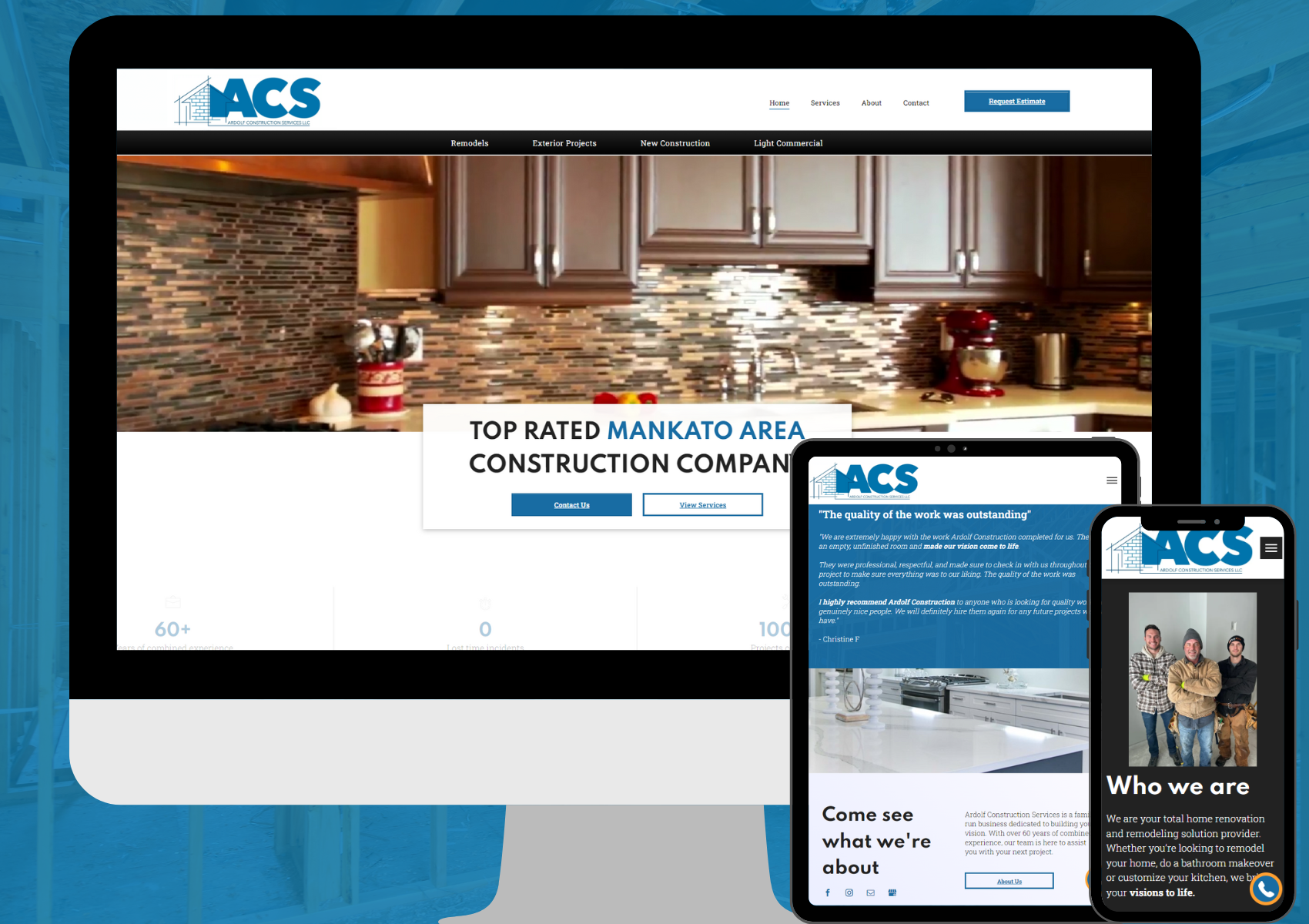
1. Company Overview and Branding
Your website serves as the initial point of contact for potential clients, making it a crucial platform for making a lasting impression.
A strong company overview on your construction business website allows you to highlight your mission, values, and what sets you apart, shining a light on the unique aspects of your brand. It's important to remember that effective branding goes beyond just a logo; it's about conveying your story in a compelling manner that resonates with your audience and creates a meaningful connection.
A compelling company overview and branding are vital for any construction company's website. This is where you convey your unique story, values, and what sets you apart in the industry.
Typography
Choose a font that reflects your brand's character. For construction companies, fonts that are bold and easy to read often work best, conveying strength and reliability.
Logo
Your logo should be memorable and representative of your construction expertise. Consider elements that symbolize construction, like buildings, tools, or geometric shapes.
Colours
Select a color scheme that resonates with your brand's personality. Earthy tones or strong primary colors often suit construction brands, symbolizing stability and robustness.
Branding Consistency
Ensure these elements are consistently used across all platforms. This consistency in typography, logo, and colors helps in reinforcing your brand identity and making your construction company easily recognizable.
Your website's design, from typography to color schemes, plays a crucial role in how clients perceive your brand. A well-thought-out design strategy can set the foundation for a strong online presence in the construction industry.
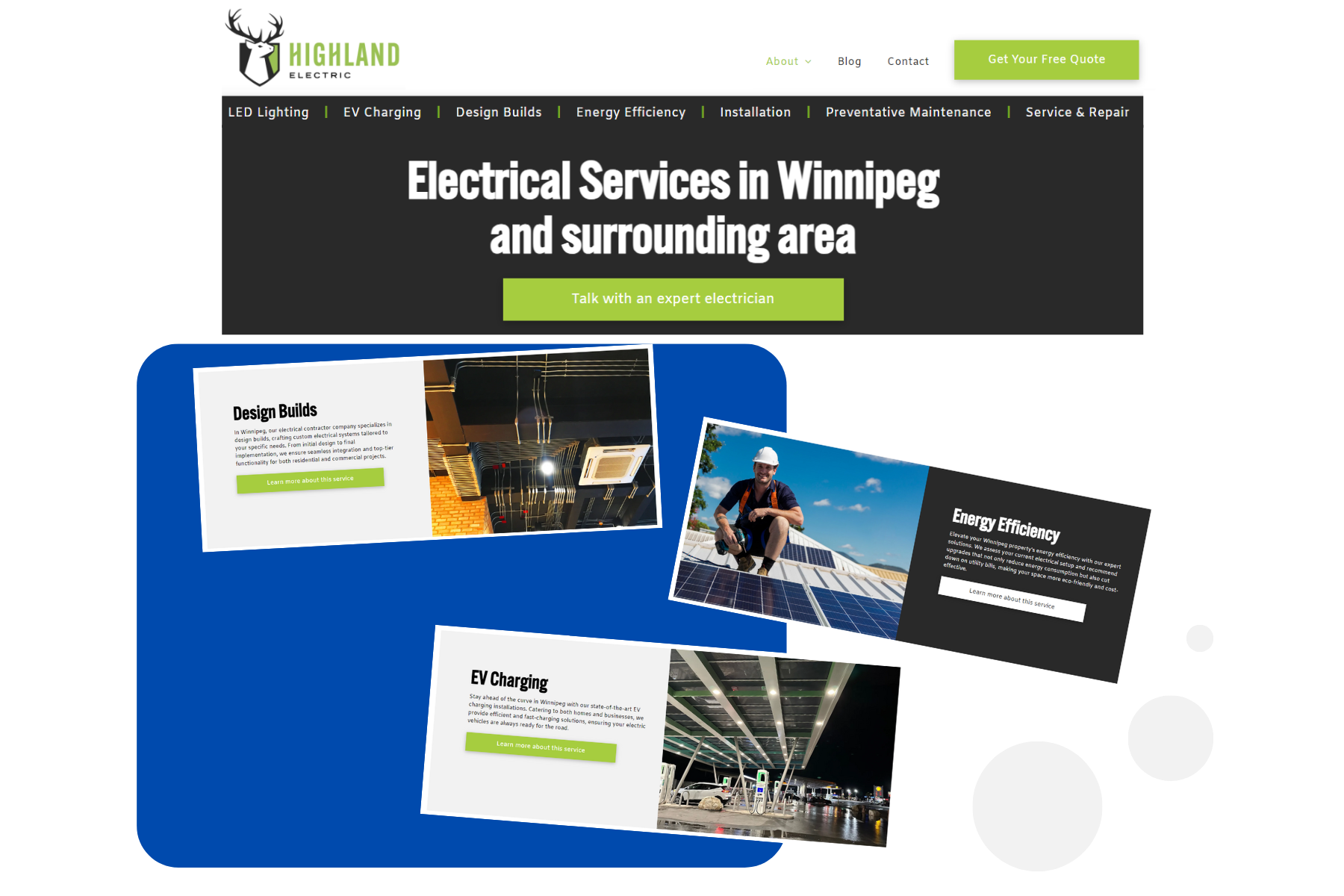
2. Services Offered
Clearly outline the comprehensive range of services you provide.
Whether it's residential construction websites, commercial projects, or specialized services, make it easy for clients to understand the full spectrum of offerings that your business provides. Using simple, jargon-free language, ensure that potential clients can easily grasp the breadth and depth of your services.
Consider incorporating icons or images to facilitate a quick and engaging read, further enhancing the accessibility and appeal of your service offerings.

3. Portfolio or Project Gallery
A picture is worth a thousand words, and for construction website designers, this couldn't be more true.
A well-curated portfolio or project gallery is crucial for a construction company's website. It visually demonstrates your expertise, range of services, and past successes.
Include high-quality images or videos of diverse projects, from residential to commercial builds, highlighting different aspects of your work like design, complexity, and scale. Accompany these visuals with brief descriptions, outlining challenges faced and how they were overcome. This not only informs your audience about your capabilities but also showcases your problem-solving skills and attention to detail.
An effective gallery can engage potential clients, build trust, and ultimately, generate more leads by vividly illustrating what your company is capable of delivering.
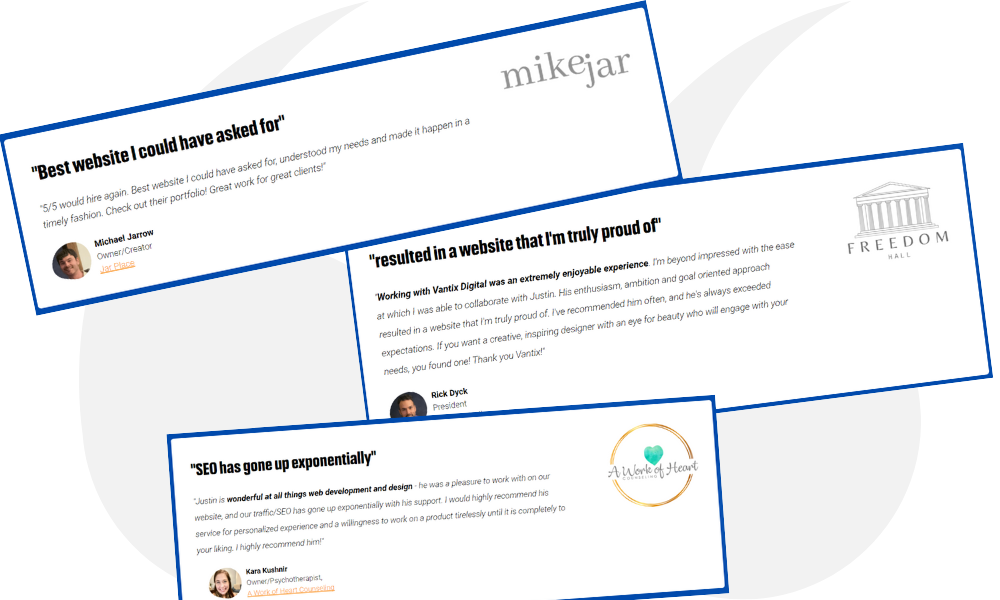
4. Client Testimonials and Reviews
Positive feedback from past clients is incredibly powerful for your business.
Client testimonials are a powerful tool for construction websites, serving as social proof of your exceptional services and customer service expertise. They contribute to building trust with potential clients by showcasing real-life examples of customer satisfaction and successful project completions. Featuring these testimonials prominently throughout your website not only highlights your credibility but also humanizes your brand.
In terms of boosting website rankings, testimonials enriched with relevant keywords can aid in SEO efforts. When clients mention specific services or positive experiences, these naturally occurring keywords help improve search engine visibility.
To maximize their impact, consider integrating testimonials on various pages, not just a dedicated section. For example, place relevant testimonials on service pages, the homepage, or near calls to action. This strategic placement ensures that prospective clients encounter these endorsements as they navigate your site, reinforcing your company's reputation for quality and reliability at every step.
In summary, client testimonials are more than just positive feedback; they are a strategic asset that can enhance both the user experience and SEO performance of your construction company's website.
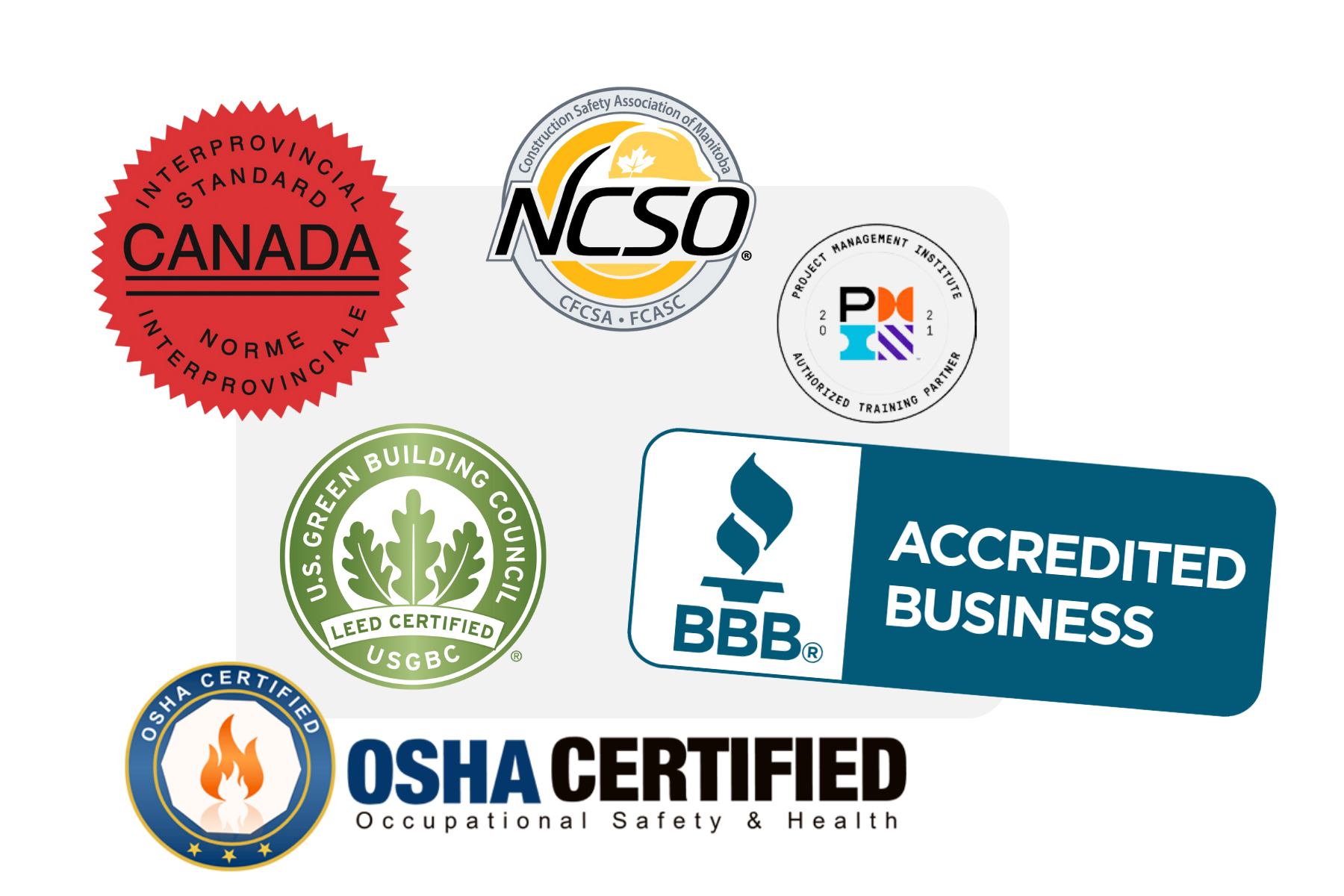
5. Licenses and Certifications
Displaying your licenses and certifications promotes credibility and trust.
These credentials serve as proof of your professional qualifications and adherence to industry standards. It assures clients that you meet the necessary standards and regulations, which is particularly important in the construction industry.
Feature them on a dedicated page or in a visible section, possibly with logos of the accrediting organizations. This not only reassures clients of your legitimacy and expertise but also differentiates your business from competitors, fostering a sense of reliability and professionalism.
6. Safety Standards and Practices
In the construction industry, emphasizing safety standards and practices on your website is crucial for building trust and credibility.
Detail your safety protocols, highlight certifications and awards, and share safety records and statistics. Including client and employee testimonials can enhance your credibility, while visuals and educational content on safety further demonstrate your commitment. Integrate safety into your brand messaging, use interactive features, and keep safety information updated. Address industry-specific safety concerns for both residential and commercial projects, and clearly outline compliance with regulations.
This approach not only showcases your responsibility but also establishes your construction company as a safe, reliable choice in the industry.
7. Contact Information
Making it easy for clients to contact you via your website boosts lead generation, enhances customer service, builds trust, increases conversion rates, allows for valuable feedback, offers a competitive edge, and fosters long-term client relationships, driving overall business growth.
Effortlessly establish a connection with your clients by offering easily accessible and transparent contact information. Enhance your construction project website by designing a dedicated contact page that features a user-friendly form, phone number, email address, and physical location if applicable. By providing these essential details, potential clients will have a clear pathway to reach out to you, streamlining the process of discussing their project requirements.
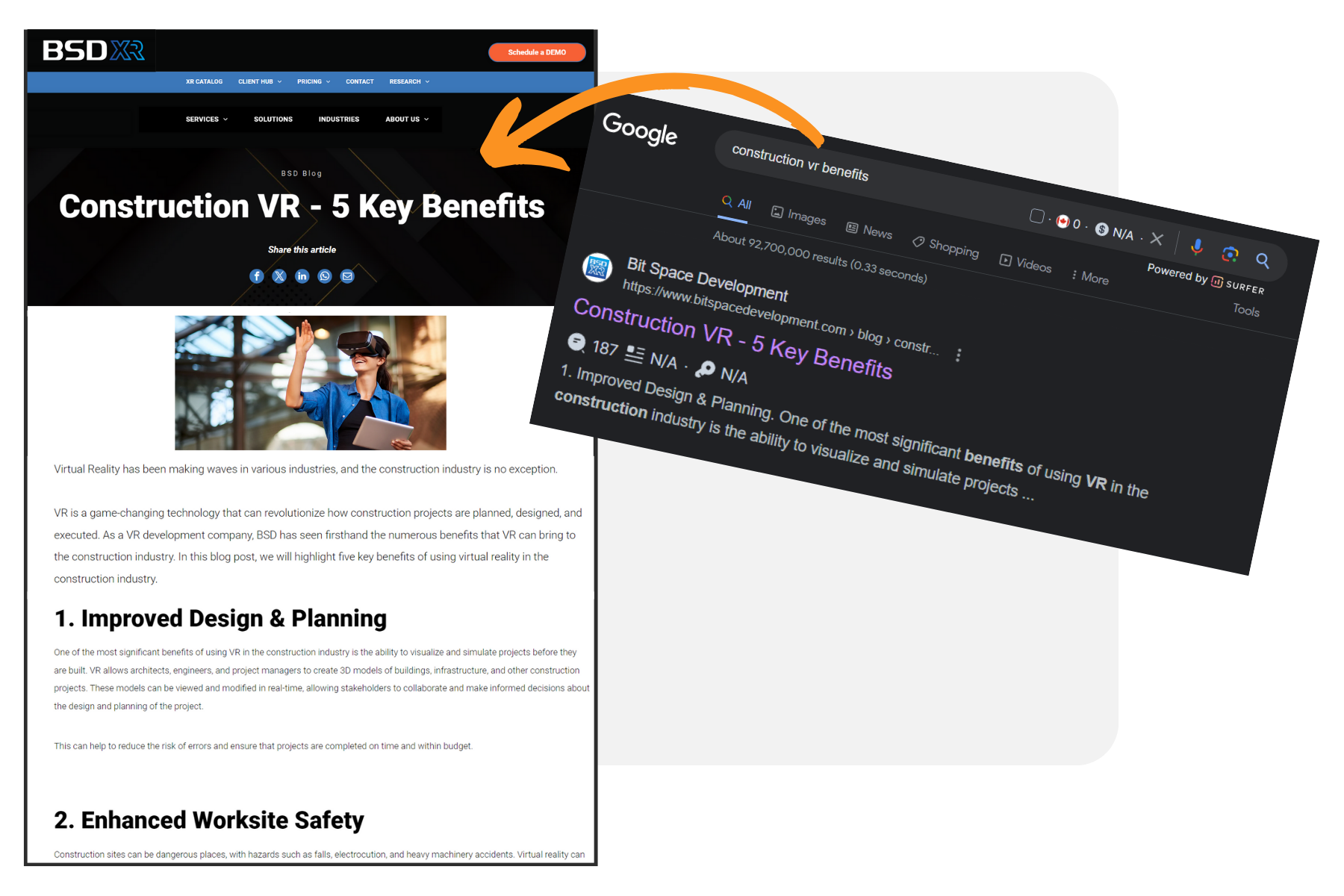
8. Blog or News Section
Adding a blog or news section to your construction design website can be a game-changer.
It's not just about providing updates; it's an opportunity to showcase your expertise, share industry insights, and improve your site's SEO. By consistently updating your content, you can establish yourself as a thought leader in your industry, build credibility with your audience, and create a valuable resource for your visitors.
Regularly updated content keeps your site fresh, relevant, and engaging, which can ultimately drive more traffic and increase user engagement. It's a powerful way to stay ahead of the competition and demonstrate your commitment to providing valuable and up-to-date information to your audience.
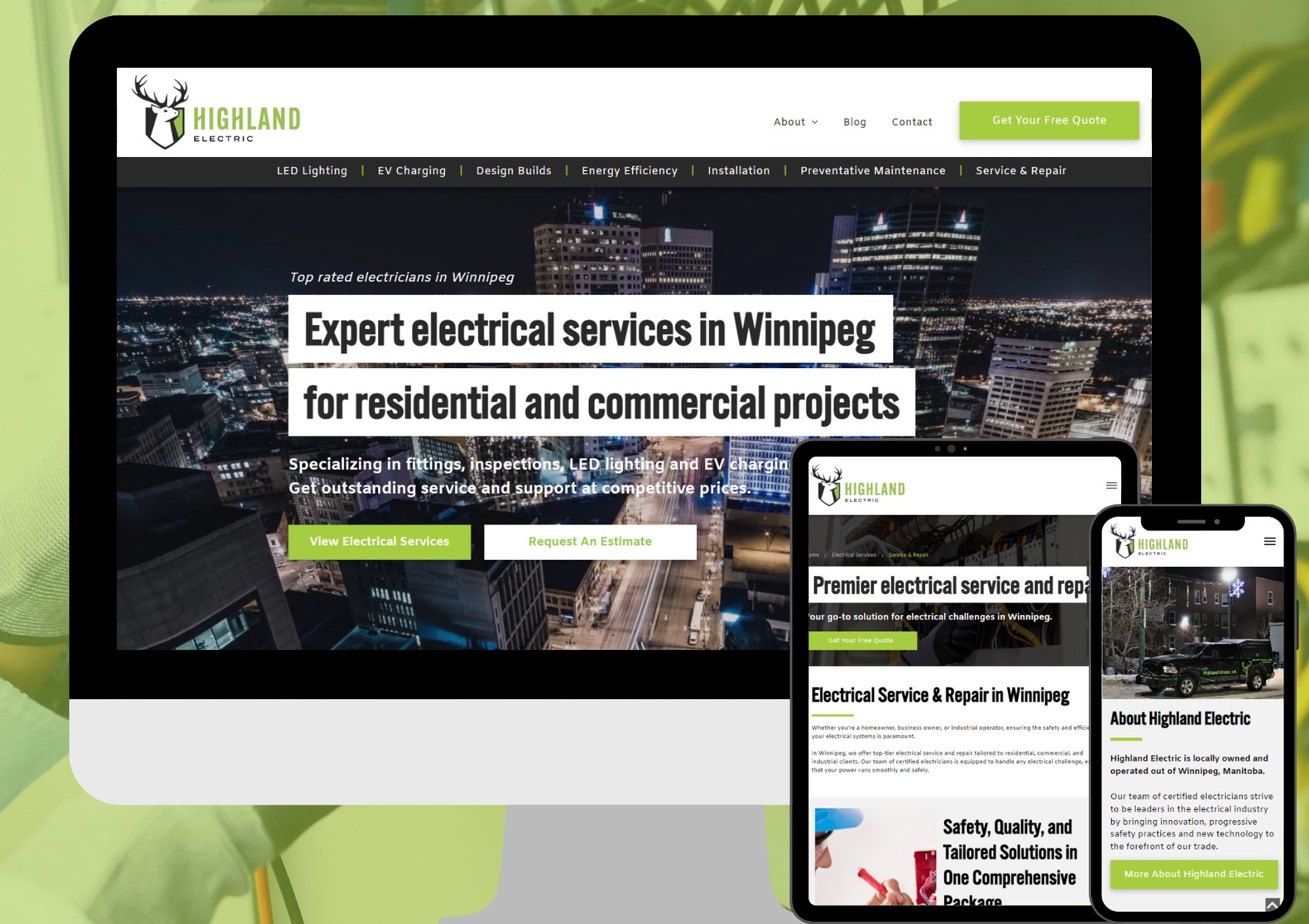
9. Responsive Design
In today's world, your construction web designer must prioritize responsive design.
Responsive design ensures your construction company's website looks great and functions well on all devices, enhancing user experience and accessibility. It adapts to various screen sizes, from desktops to smartphones, crucial in today's mobile-dominated internet usage.
This adaptability improves SEO rankings as search engines favor mobile-friendly sites, potentially increasing visibility and attracting more visitors. A responsive design also simplifies website maintenance, as it eliminates the need for separate versions for different devices.
Responsive web design can boost your construction website by:
Enhanced User Experience
Responsive design ensures that the website is easily navigable and visually appealing on any device, be it a desktop, tablet, or smartphone. This adaptability makes it more likely that visitors will stay longer and engage more with the content.
Improved SEO Rankings
Search engines, like Google, prioritize mobile-friendly websites in their search results. A responsive design is key to achieving better visibility in search rankings, which can lead to increased traffic to the website.
Increased Reach
With the growing number of people accessing the internet via smartphones and tablets, a responsive website can reach a wider audience. This is particularly important in the construction industry, where clients might look up services on-the-go.
Cost-Effective
Maintaining one responsive website is more cost-effective than having separate versions for desktop and mobile devices. This unified approach saves time and resources in website development and maintenance.
Consistent Branding
A responsive design ensures that your website maintains a consistent look and feel across all devices, reinforcing your brand identity. This consistency helps in building trust and recognition with your audience.
Better Conversion Rates
Websites that are easy to use and navigate on any device are more likely to convert visitors into leads or customers. A responsive design improves the overall user experience, making it easier for potential clients to contact the company, request quotes, or engage with content.
By focusing on these areas, construction companies can significantly
enhance their online presence and appeal to a broader, more diverse audience.
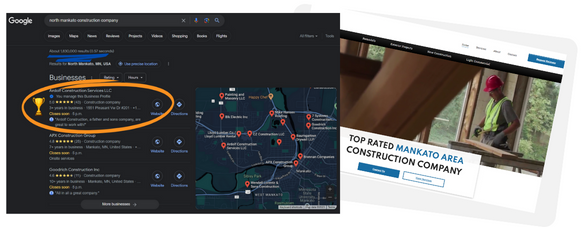
10. SEO Optimization
Search Engine Optimization is crucial for construction companies as it enhances their online visibility and attracts more potential clients.
By optimizing their website for search engines, construction companies can rank higher in search results, making it easier for clients searching for construction services to find them. Effective SEO involves using relevant keywords, creating quality content, ensuring mobile-friendliness, and improving website speed.
Additionally, local SEO strategies like listing the business on local directories and optimizing for local search terms can attract clients in specific geographic areas.
This heightened online presence leads to increased traffic, more inquiries, and ultimately, more business opportunities.
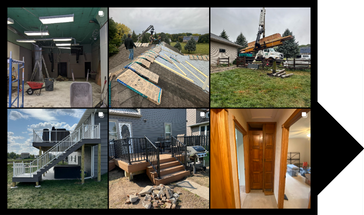
11. Social Media Integration
Integrating your website with social media platforms, such as Instagram and Facebook, can greatly enhance your online presence and boost your brand's visibility.
By seamlessly connecting your website to popular social media channels, you can provide a convenient way for clients to follow your projects and updates, fostering a sense of community and engagement. Ensure that links to your social media profiles are prominently displayed and easily accessible, enabling visitors to effortlessly connect with your brand across various platforms. This integration not only expands your reach but also strengthens your online presence, ultimately contributing to the overall success of your digital marketing strategy.

12. Call to Action (CTA)
Every page on your website should have a clear call to action.
Whether it's to get a quote, view a portfolio, or contact you, a CTA guides visitors towards the next step in their client journey. A strong Call to Action is pivotal for construction companies to guide website visitors towards desired actions, thus improving conversions. CTAs should be clear, compelling, and strategically placed to grab attention and prompt immediate response.
Examples of effective CTAs for construction companies:
1. Request a Quote: Encourages potential clients to inquire about specific services.
2. Schedule a Consultation: Offers a personal touch, inviting prospects to discuss their projects.
3. Download Our Brochure: Provides detailed information about services and projects.
4. View Our Portfolio: Showcases previous work, building trust and interest.
5.
Sign Up for Updates: Keeps visitors engaged with the latest news and offers.
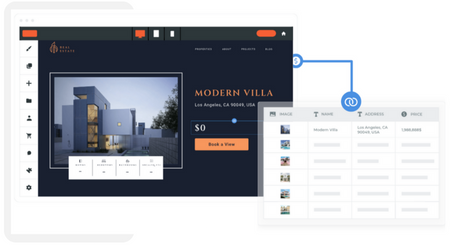
13. Interactive Elements
Adding interactive elements to your site can greatly enhance user engagement.
Consider including features like a dynamic project map, showing locations of past and current projects, or an interactive timeline of your company's history. Interactive tools such as cost estimators or design customizers also engage visitors and provide practical value.
These elements make the website experience more engaging and memorable, encouraging visitors to spend more time learning about your services and expertise.
14. Accessibility
Ensuring your website is accessible to all users, including those with disabilities, expands your potential client base.
Ensure your website is navigable via keyboard and compatible with screen readers. Use alt text for images, subtitles for videos, and maintain a high contrast between text and background colors. Additionally, provide options to change font size and avoid using flashing or blinking elements. These practices not only make your site accessible to individuals with disabilities but also improve overall user experience and can positively impact your SEO performance.

15. Speed and Performance Optimization
The loading speed of your website is critical.
Slow-loading sites can drive visitors away and negatively impact your search engine rankings. Optimize images, leverage browser caching, and minimize the use of heavy scripts to ensure your site is as fast and responsive as possible. Fast-loading pages enhance user experience, reducing bounce rates and improving engagement. Optimal performance on both mobile and desktop ensures users access information quickly and efficiently. This speed is vital for SEO, as search engines rank faster sites higher.
Maintaining high performance also reflects your company's professionalism and attention to detail, crucial in the construction industry.
In conclusion..
a well-designed website is a powerful tool for any construction company, whether it's for residential construction websites or commercial construction websites. It's an investment in your brand and a platform to showcase your expertise and attract new clients. By focusing on these key areas, your construction business can build a strong online presence that mirrors the quality and professionalism of your real-world projects.
Remember, in the competitive field of construction, your website can be the difference between blending in and standing out. As enthusiastic construction website designers in Winnipeg, we understand the nuances of creating impactful, user-friendly websites that resonate with your target audience. If you're ready to elevate your online presence, contact us and let's build something great together!
Optimize your construction website with our web design experts
Share this Article
Recent blog posts

Ready to love your website?
Book time with Justin to see if Vantix is the right fit for your business.
Growth Services
Company
Contact Vantix
1044 Bairdmore Blvd. Unit 1104
Winnipeg, MB R3P 1Z5
All Rights Reserved | Vantix Digital




